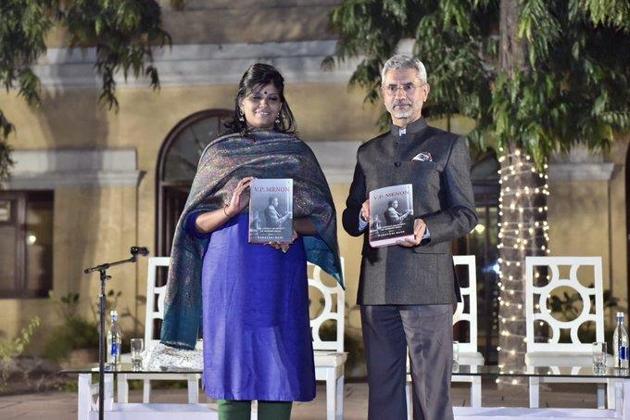Jaishankar’s post on Jawaharlal Nehru and Sardar Patel kicks up Twitter slugfest
Jaishankar, who launched the book “VP Menon, the unsung architect of modern India” here on Wednesday, tweeted that he “learnt from the book that Nehru did not want Patel in the Cabinet in 1947 and omitted him from the initial Cabinet list.
Foreign minister S Jaishankar found himself in the middle of a tweet-storm over a claim in a book he released that India’s first Prime Minister Jawaharlal Nehru initially didn’t want to include Sardar Patel in the country’s first cabinet.

Jaishankar, who launched the book “VP Menon, the unsung architect of modern India” here on Wednesday, tweeted that he “learnt from the book that Nehru did not want Patel in the Cabinet in 1947 and omitted him from the initial Cabinet list. Clearly, a subject for much debate. Noted that the author stood her ground on this revelation.”
Historian Ramachandra Guha was quick to respond. “This is a myth, that has been comprehensively demolished by Professor Srinath Raghavan in The Print. Besides, promoting fake news about, and false rivalries between, the builders of modern India is not the job of the Foreign Minister. He should leave this to the BJP’s IT Cell,” Guha said, also in a tweet.
The debate spiralled from there with Jaishankar holding his ground. “Some Foreign Ministers do read books. May be a good habit for some Professors too. In that case, strongly recommend the one I released yesterday,” he tweeted.
The book’s author, historian and foreign policy analyst Narayani Basu (Menon was her great-grandfather) wrote that according to “both Menon and Vidya Shankar (Patel’s private secretary), Nehru’s original list (of ministers) excluded Patel altogether.” In the chapter titled “Omission”, Basu also said that India’s last viceroy Lord Mountbatten had to intervene to include Patel in the cabinet. She also quoted what Mountbatten told British journalist Harry Hodson to drive home her point. But Basu also said that Mountbatten, who was otherwise meticulous with records, didn’t record his conversations with Nehru on this issue anywhere.
The Nehru-Patel rivalry has been played up by the Bharatiya Janata Party, which has sought to claim the legacy of India’s first home minister, a member of the Congress. It even built a large statue in his honour, the Statue of Unity, in Gujarat.
In response to Jaishankar’s tweet, former union minister Jairam Ramesh tweeted a series of letters and said: “In light of the fake news doing the rounds that Pandit Jawaharlal Nehru did not want Sardar Vallabhbhai Patel in his cabinet, sharing a series of letters & documents.” He said “the truth was Nehru’s letter to Mountbatten of July 19, 1947 had Patel’s name right on top of new cabinet list.”
Taking a dig at Jaishankar, Ramesh tweeted, “Problem with this very accomplished and erudite foreign minister is that he wishes to forget the books he read before becoming Foreign Secretary in Jan 2015. Do refresh your memory...” The papers posted by Ramesh also showed that Nehru kept his own name at the end of the list. Ramesh posted two letters from Nehru to Patel to underline the friendship between India’s first PM and his home minister. In one letter, Nehru informed Patel that he had convinced BR Amebdkar to be the law minister of the country and asked him to “approach Shyama Prasad (Mukherjee), Rajaji (C Rajagopalachari) and Shanmukham (Ramasamy CK Shanmukham Chetty).”
In another letter, Nehru formally invited Patel to the cabinet saying, “As formalities have to be observed to some extent, I am writing to invite you to join the new cabinet. This writing is somewhat superfluous as you are the strongest pillar of the cabinet.”
Another former minister Shashi Tharror also entered the debate and tweeted: “Jai, I have the highest regard for VP Menon, a hero of Indian Independence from my state, but human recollections can be wrong. Read this carefully documented refutation of the “Patel’s omission from Cabinet” story (for which VPM was the only source).” he pointed to an article in The Print that said the narrative of Nehru omitting patel from the cabinet initially was false.
In a statement, Basu said: “Everything is in the public domain. Historical interpretation remains subjective. However, while it is important to have some debate/disagreement around a subject, it is now seventy years after the fact. Frankly, this is not the core of my book. Nor was it the core of VP Menon’s life. He made contributions to the history of this country that deserve to be highlighted, and not sidetracked.”
“I wrote this biography to illuminate a man who has been overshadowed by history, and not to have this book caught in the crosshairs of a political bushfire,” she added.






